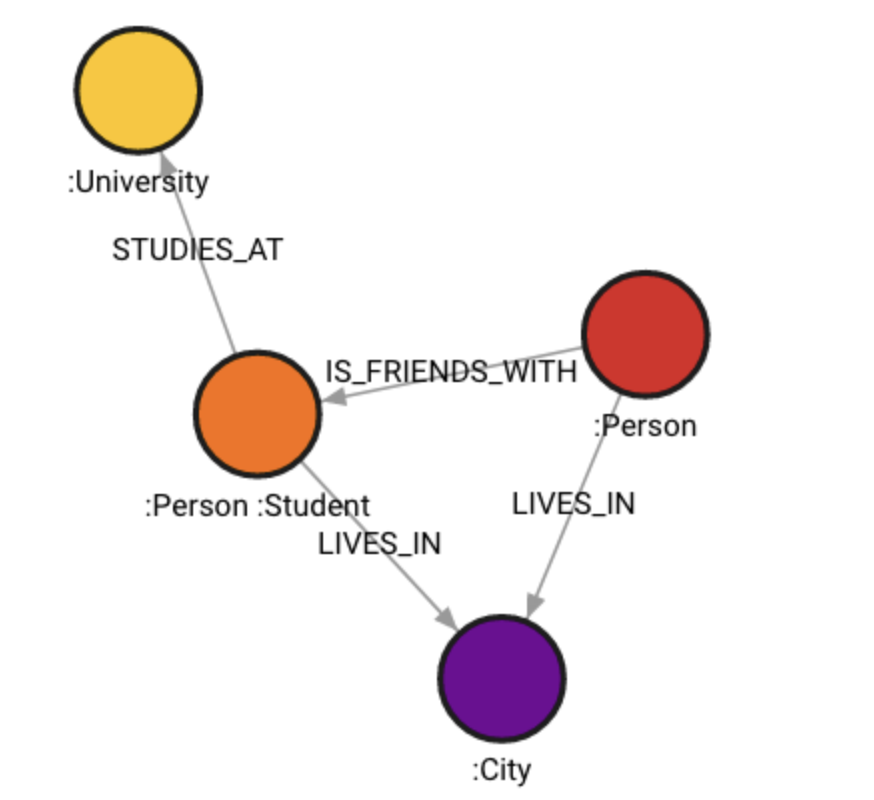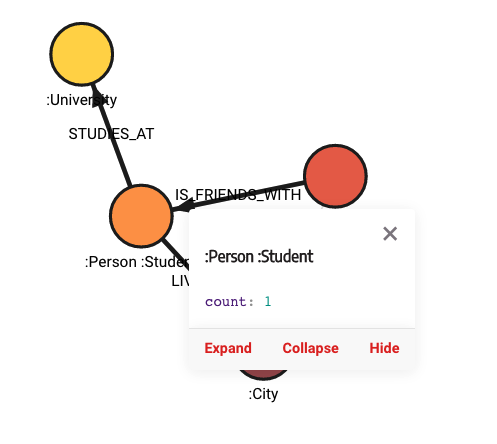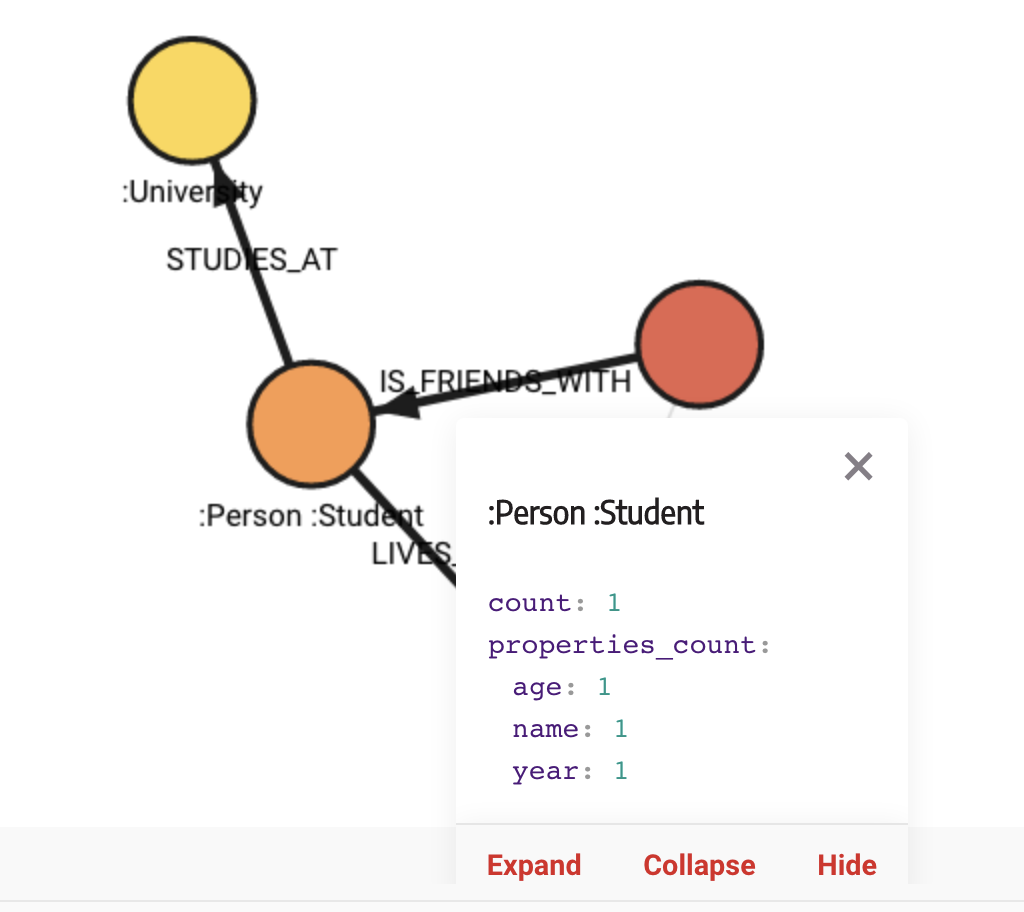meta_util
A module that contains procedures describing graphs on a meta-level.
| Trait | Value |
|---|---|
| Module type | util |
| Implementation | Python |
| Parallelism | sequential |
Procedures
You can execute this algorithm on graph projections, subgraphs or portions of the graph.
schema()
Knowing what kind of data, that is, what kind of nodes and relationships, are stored inside the database and how they’re connected can be helpful. Besides that, each node or relationship can have a set of properties, and while loading the data in the database, you should be sure that a certain amount of graph objects has a particular property. That’s where the number of graph objects with a particular property (property count) might come in handy.
The schema() procedure returns a list of distinct relationships connecting
distinct nodes, that is, a graph schema. If include_properties is set to
true, the graph schema will contain additional information about properties.
Input:
-
subgraph: Graph(OPTIONAL) ➡ A specific subgraph, which is an object of type Graph returned by theproject()function, on which the algorithm is run. If subgraph is not specified, the algorithm is computed on the entire graph by default. -
include_properties: bool (default=false)➡ If set totrue, the graph schema will include properties count information.
Output:
nodes: List[Map]➡ List of distinct node objects with their count. Ifinclude_propertiesis set totrue, the node object contains properties count too.relationships: List[Map]➡ List of distinct relationship objects with their count. Ifinclude_propertiesis set totrue, the relationship object contains properties count too.
Usage:
Get graph schema without properties count:
CALL meta_util.schema()
YIELD nodes, relationships
RETURN nodes, relationships;Get graph schema with properties count:
CALL meta_util.schema(true)
YIELD nodes, relationships
RETURN nodes, relationships;The queries above will return results in the graph view only in Memgraph Lab
versions >= 2.4.0. For earlier versions of the Memgraph Lab, call UNWIND on
returned object properties nodes and edges.
Example
Create a graph
Create a graph by running the following Cypher query:
CREATE (n:Person {name: "Kate", age: 27})-[:IS_FRIENDS_WITH]->(m:Person:Student {name: "James", age: 30, year: "second"})-[:STUDIES_AT]->(:University {name: "University of Vienna"})
WITH n, m
CREATE (n)-[:LIVES_IN]->(:City {name: "Zagreb"})<-[:LIVES_IN]-(m);Create a schema
Once the graph is created, run the following query to call the schema procedure:
CALL meta_util.schema()
YIELD nodes, relationships
RETURN nodes, relationships;The graph result of the schema procedure in Memgraph Lab:


Memgraph Lab can also return data results - a list of nodes and a list of relationships:
[
{
"id": 0,
"labels": [
"Person"
],
"properties": {
"count": 1
},
"type": "node"
},
{
"id": 1,
"labels": [
"Person",
"Student"
],
"properties": {
"count": 1
},
"type": "node"
},
{
"id": 2,
"labels": [
"University"
],
"properties": {
"count": 1
},
"type": "node"
},
{
"id": 3,
"labels": [
"City"
],
"properties": {
"count": 1
},
"type": "node"
}
]Here is the obtained list of relationships:
[
{
"end": 1,
"id": 0,
"label": "IS_FRIENDS_WITH",
"properties": {
"count": 1
},
"start": 0,
"type": "relationship"
},
{
"end": 3,
"id": 1,
"label": "LIVES_IN",
"properties": {
"count": 1
},
"start": 0,
"type": "relationship"
},
{
"end": 2,
"id": 2,
"label": "STUDIES_AT",
"properties": {
"count": 1
},
"start": 1,
"type": "relationship"
},
{
"end": 3,
"id": 3,
"label": "LIVES_IN",
"properties": {
"count": 1
},
"start": 1,
"type": "relationship"
}
]Create a schema including the properties count
Run the following code to call the schema procedure including the properties
count:
CALL meta_util.schema(true)
YIELD nodes, relationships
RETURN nodes, relationships;The graph result of the schema procedure seen in Memgraph Lab:


Memgraph Lab can also return data results - a list of nodes and a list of relationships:
[
{
"id": 0,
"labels": [
"Person"
],
"properties": {
"count": 1,
"properties_count": {
"age": 1,
"name": 1
}
},
"type": "node"
},
{
"id": 1,
"labels": [
"Person",
"Student"
],
"properties": {
"count": 1,
"properties_count": {
"age": 1,
"name": 1,
"year": 1
}
},
"type": "node"
},
{
"id": 2,
"labels": [
"University"
],
"properties": {
"count": 1,
"properties_count": {
"name": 1
}
},
"type": "node"
},
{
"id": 3,
"labels": [
"City"
],
"properties": {
"count": 1,
"properties_count": {
"name": 1
}
},
"type": "node"
}
]Here is the obtained list of relationships:
[
{
"end": 1,
"id": 0,
"label": "IS_FRIENDS_WITH",
"properties": {
"count": 1,
"properties_count": {}
},
"start": 0,
"type": "relationship"
},
{
"end": 3,
"id": 1,
"label": "LIVES_IN",
"properties": {
"count": 1,
"properties_count": {}
},
"start": 0,
"type": "relationship"
},
{
"end": 2,
"id": 2,
"label": "STUDIES_AT",
"properties": {
"count": 1,
"properties_count": {}
},
"start": 1,
"type": "relationship"
},
{
"end": 3,
"id": 3,
"label": "LIVES_IN",
"properties": {
"count": 1,
"properties_count": {}
},
"start": 1,
"type": "relationship"
}
]